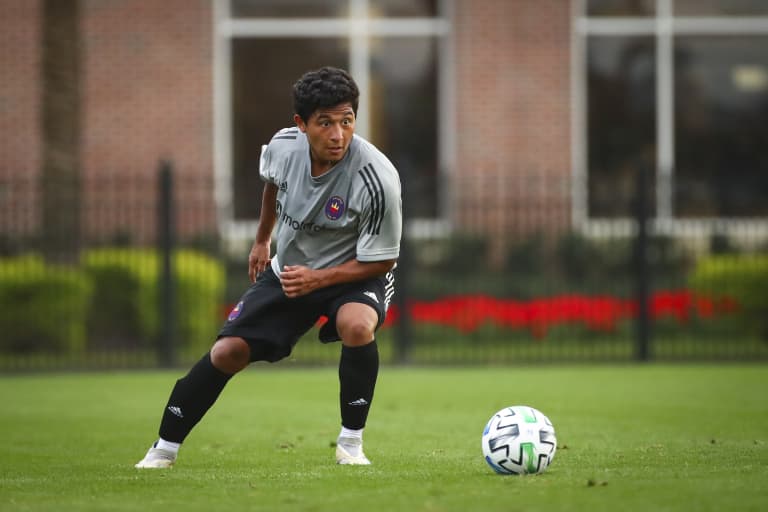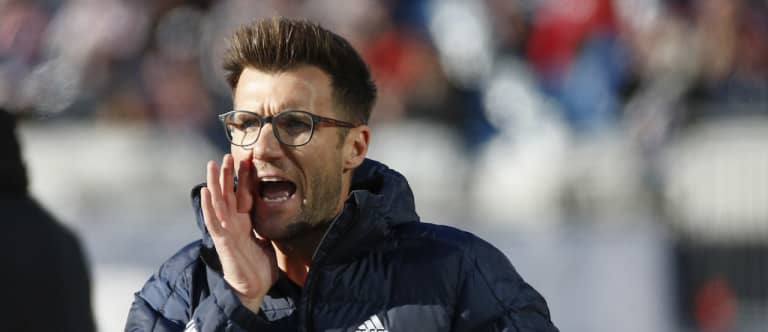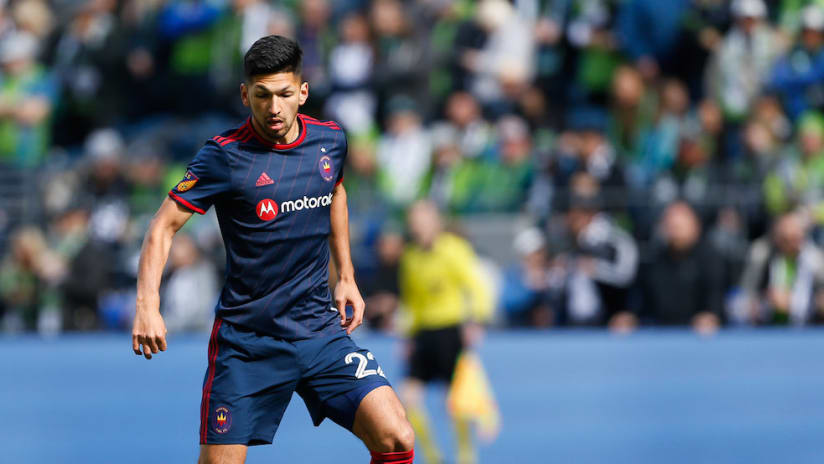Pop quiz: Which MLS clubs have the most Homegrown Players on their current rosters? No peeking, now…
It’s not particularly difficult to guess well-known Players of Kids FC Dallas lead the way, nor are the high rankings of academy-centric sides like Real Salt Lake, Sporting KC and the Vancouver Whitecaps a big surprise.
But did you have Chicago Fire FC at the No. 2 spot? Probably not.
But that’s where they sit at present, thanks to a startling flurry of HGP signings over the past few months – seven since December, five of them just in the month of March, pushing their active total to 11 Homegrowns. They range in age from 15-year-old midfielder Allan Rodriguez, an Indiana native spotted by the Fire's affiliate program in that state, to Mauricio Pineda, 22, who signed on after a four-year college career at UNC and has already logged two full-90 performances in the first two weeks of the since-suspended 2020 MLS season.

Allan Rodriguez became the 20th Homegrown Player signed by Fire FC | Chicago Fire FC
It’s a dramatic turnaround for the Windy City club, considering not long ago the Fire’s academy pipeline had slowed to a trickle. So what happened? You can chalk it up to the long list of changes instituted by new owner Joe Mansueto.
“He absolutely wants the club to work with talents, with young players,” explained sporting director Georg Heitz in a recent conversation with MLSsoccer.com. “Of course, we are also ambitious; someday we want to win titles, it is clear. We are very ambitious – the sooner the better! But also we will have a big focus on the academy players, as long as their quality is good.
“I mean, this is essential,” he noted. “This should not be a marketing action to provide them with contracts, it should be purely due to the things they have proven on the pitch … So you need an owner who is willing to invest also in young talent, and you need a head coach who's willing to to spend time on talented players.”
Heitz and the Fire have the latter in the form of head coach Raphael Wicky, his former colleague at FC Basel in their native Switzerland, who was lured away from his US Under-17 national team gig across town at the U.S. Soccer Federation to oversee the on-field component of Fire FC’s rebuild. The two men were also joined in Chicago over the winter by a former Basel figure in technical director Sebastian Pelzer.
While no one is making any bold predictions just yet, it’s clear the Swiss side’s long track record of blue-chip products like Ivan Rakitic, Yann Sommer, Granit Xhaka and Xherdan Shaqiri is a big influence on the trio’s blueprint for the Fire. The challenge for Wicky is to spot and groom the academy prospects without sacrificing near-term results, as Chicago seek to fill massive Soldier Field with a compelling entertainment product.
“Looking at the club, it's a different scenario [from Basel],” said Heitz. “But it’s one of the reasons why we appointed Rapha as head coach, because we knew that he's willing to work with young players – not only young players, but he's willing to work, he's open-minded.
“When we came here,” he added, “Rapha and myself, we asked the heads of the academy: Where are your talented players? So they sent us a couple for training, and we were really convinced. I think they showed – of course they need a moment to adapt, because the pace is different, which is clear – but how quickly they adapted, the way they adapted was really impressive. So, we had no doubt that they can help us. Maybe not so much tomorrow, but very soon. We also think that they need to train with the first team in order to really get used to the pace, to the physical demands that we have.”

Raphael Wicky had a lot of experience working in youth development as the US U-17 coach | USA Today Sports Images
Pineda’s arrival and strong start are particularly ripe with significance, given he’s the younger brother of Victor Pineda, Chicago’s first-ever Homegrown and a not particularly successful case study for the club’s developmental pipeline over his five seasons with the Fire, which comprised just 40 total minutes of MLS action.
At one point it looked like Mauricio might walk away from his HGP contract offer, and perhaps wind up in the 2020 SuperDraft. Now he’s a first-team starter and, the Fire hope, a walking manifestation of their rebranded team’s renewed connection to the city and region they call home.
“Look, we should be highly entertaining, this is our ambition. This is why I say we want to have an active team,” noted Heitz. “And of course we want to play with local players as well. We have a wonderful example of it with Mauricio Pineda. For me, he came out of the blue, and really made two great performances … And we have more talent to come.”
Heitz’s own transition to North America has been complicated by the COVID-19 pandemic, with his wife still unable to join him in Illinois thanks to its disruptions of the usual travel and immigration procedures. He’s also dealing with a steep learning curve as he familiarizes himself with the influence of college soccer and other unique aspects of the American youth soccer landscape in the midst of a sweeping reinvention of the club.
He, Mansueto and their staff are working to upgrade the Fire’s current training facilities at SeatGeek Stadium – where extra locker-room space was recently carved out for academy kids – while also exploring longer-term avenues for a new complex, likely closer to the city center.
He says he likes the option of short-term loans to USL clubs to expose their young players to professional match play, singles out academy boss Cedric Cattenoy for praise and admits to having been “very surprised … and positively surprised” at the level of the youth prospects who’ve joined first-team sessions this year.
“You have so many talents and I always say you don't have to go too far, because we live in an area here with more than 10 million people. So there must be a couple of really interesting talents,” said Heitz. “I think we have to work on the infrastructure, which we will, and we have to be attractive for young talent. Then we can convince them. We also have to make sure – and we have with Brian Roberts [head of academy operations and director of the club's PASS academics program] someone who really takes care of that – we don't forget about the schooling, the education. School is important for the boys.”
It adds up to a hefty to-do list for everyone in Chicago, in a truly watershed year for the club. But in the long run, the Fire are ready and willing to join the league-wide race to prepare their best young players for overseas export – and they’ve got a brain trust with a substantial resume of doing just that.
“First of all we want to be successful with Chicago Fire,” Heitz added. “The other thing would come after, when you are successful. This league has proven that you have players who can play for the biggest clubs in Europe.”













